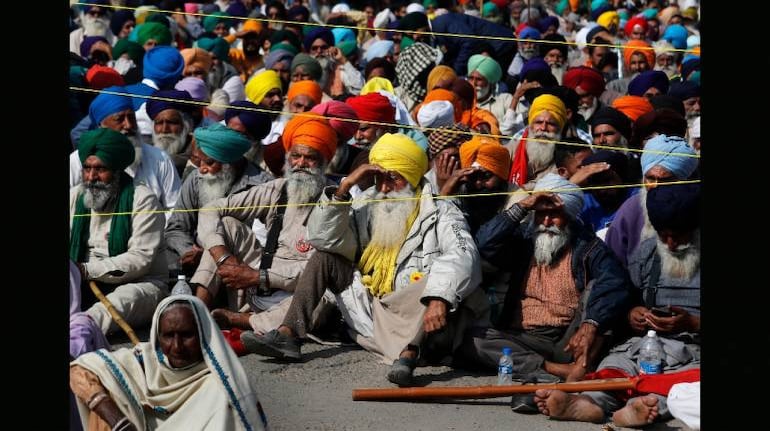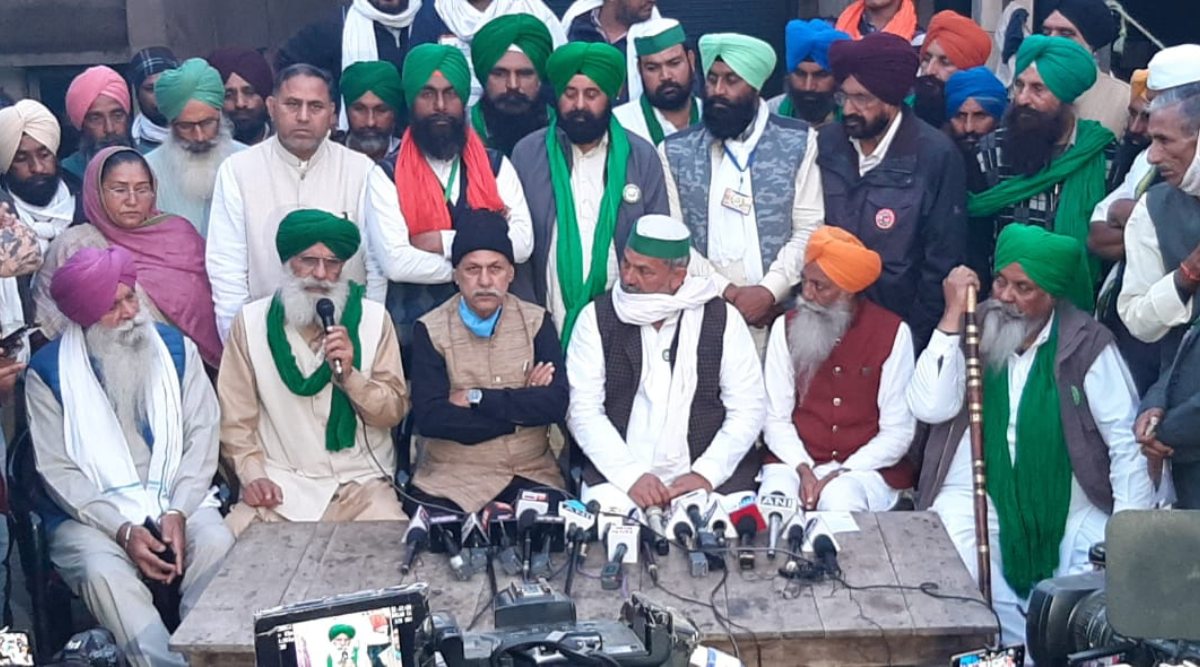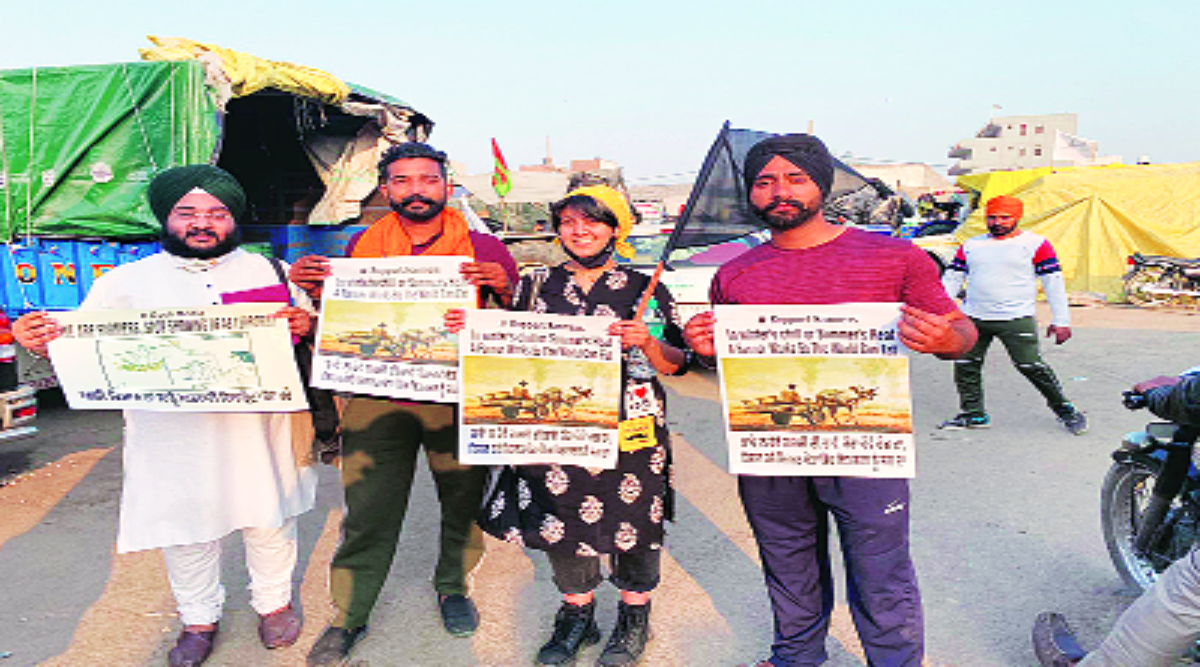
Sikh farmers have been great ambassadors of India's agri skills
In the last two decades, farming in Punjab has become increasingly unremunerative and with hardly any other industry in the state, there are no jobs for the young, who face a bleak and hopeless future.
Agricultural reforms, with the right motive and intention, are the crying need of the state.
SUNDEEP KHANNA
DEC 14, 2020 /
The Indian government and protesting farmers were unable to reach common ground in talks held on December 1, with the farmers saying their demonstrations against new agriculture laws will continue as will their blockades of key highways. (Image: AP)
Whatever be the politics of the current farm agitation there’s no denying the high esteem the Indian farmer from Punjab is held in across agricultural hubs of the world. Much like the country’s IT professionals who have carved a niche for themselves in the world of computing, Sikh farmers have used their skills gained from tilling the fields at home to make a mark in various parts of the world ranging from Argentina to Italy.
Their contribution to the dairy industry in Italy, is too recent and too well-known to need recounting. The headlines alone will suffice. ‘In Italian Heartland, Indians Keep the Cheese Coming’, wrote The New York Times (NYT), while Al Jazeera kept it to a simpler: ‘The Indians saving Italy’s traditional cheese industry’, and the BBC gave them a precise name: ‘The Sikhs who saved Parmesan’.
Through the 1980s and 1990s, so many of them made their way to the country’s agricultural zones that the term Sikh Route came into prevalence. Today, their hard work and expertise in dairy farming has made them integral to the Italian cheese industry.
It is a journey they have been taking for over a 100 years now. In his punjabi book ‘Unfole Warke’, Baba Bhagat Singh Bilga, a member of the legendary Gadar Party who passed away in 2009 at the ripe old age of 102, writes about the journey of the Sikhs to Argentina in 1910-11 to work in the sugar mills and railway workshops of Buenos Aires and Rosario.
Soon enough their labours took them to the farms and eventually led to owning many of them. A delightful article quoted by the Sikh Global Village, talks about Jiwa Singh and Tara Singh of village Boparai Khurd in Jalandhar district, who migrated to Argentina in 1958 and became one of the leading farm owners of Rosario de la Frontera.
In Canada too, Sikhs who first migrated to the country in the first few decades of the 20th century have proven themselves as ace farmers adept at picking up newer and more lucrative crops to cultivate. In fact, in Richmond, Vancouver, they were responsible for a revolution in cranberries. A few years ago Peter Dhillon, a Canadian Sikh farmer, who is the country’s biggest cranberry grower, was inducted into the country’s prestigious Agricultural Hall of Fame.
According to The Tribune, ‘Dhillon is also the current chairman of Ocean Spray — a marketing cooperative of cranberry farmers in the US and Canada. Ocean Spray sells its products in over 90 countries, with annual sales of over $2.5 billion.’
In their endeavours to leave their shores for better prospects abroad, they have had institutional help at home. When 10 years ago the Canadian government, facing a shortage of farmers following the retirement of many locals, started recruiting trained farmers from around the world to migrate to the country, the Ludhiana-based Punjab Agricultural University (PAU) devised special courses which included training in Canadian agri practices.
When states like Manitoba launched special schemes such as the ‘Young Farmer Nominee Programme’ (YFNP) for those below the age of 40, many Sikh farmers were well placed to take advantage of the opportunities.
Overseas success has come on the back of advances at home. For almost 20 years following the green revolution, Punjab was India’s most prosperous state and a beacon for others looking to increase the productivity of its land and people. In 1982, some 15 years after the Green Revolution, a report in The New York Times hailed the efforts of the which saw the state being held up by the World Bank as an outstanding example of how agricultural transformation might occur in the developing world.
For its achievements, the NYT pointed to the ‘Punjabi character’ and quoted MS Sra, the director of Punjab Department of Agriculture, who attributed the success to the Sikh farmers, ‘renowned for their enterprise, mechanical skill, appreciation of profit and willingness to experiment.’In the last two decades, farming in Punjab has become increasingly unremunerative and with hardly any other industry in the state, there are no jobs for the young, who face a bleak and hopeless future. Agricultural reforms, with the right motive and intention, are the crying need of the state. But none of this can deflect from the sterling reputation of the Sikh farmers.
SUNDEEP KHANNA is a senior journalist. Views are personal.
SUNDEEP KHANNA
DEC 14, 2020 /
The Indian government and protesting farmers were unable to reach common ground in talks held on December 1, with the farmers saying their demonstrations against new agriculture laws will continue as will their blockades of key highways. (Image: AP)
Whatever be the politics of the current farm agitation there’s no denying the high esteem the Indian farmer from Punjab is held in across agricultural hubs of the world. Much like the country’s IT professionals who have carved a niche for themselves in the world of computing, Sikh farmers have used their skills gained from tilling the fields at home to make a mark in various parts of the world ranging from Argentina to Italy.
Their contribution to the dairy industry in Italy, is too recent and too well-known to need recounting. The headlines alone will suffice. ‘In Italian Heartland, Indians Keep the Cheese Coming’, wrote The New York Times (NYT), while Al Jazeera kept it to a simpler: ‘The Indians saving Italy’s traditional cheese industry’, and the BBC gave them a precise name: ‘The Sikhs who saved Parmesan’.
Through the 1980s and 1990s, so many of them made their way to the country’s agricultural zones that the term Sikh Route came into prevalence. Today, their hard work and expertise in dairy farming has made them integral to the Italian cheese industry.
It is a journey they have been taking for over a 100 years now. In his punjabi book ‘Unfole Warke’, Baba Bhagat Singh Bilga, a member of the legendary Gadar Party who passed away in 2009 at the ripe old age of 102, writes about the journey of the Sikhs to Argentina in 1910-11 to work in the sugar mills and railway workshops of Buenos Aires and Rosario.
Soon enough their labours took them to the farms and eventually led to owning many of them. A delightful article quoted by the Sikh Global Village, talks about Jiwa Singh and Tara Singh of village Boparai Khurd in Jalandhar district, who migrated to Argentina in 1958 and became one of the leading farm owners of Rosario de la Frontera.
In Canada too, Sikhs who first migrated to the country in the first few decades of the 20th century have proven themselves as ace farmers adept at picking up newer and more lucrative crops to cultivate. In fact, in Richmond, Vancouver, they were responsible for a revolution in cranberries. A few years ago Peter Dhillon, a Canadian Sikh farmer, who is the country’s biggest cranberry grower, was inducted into the country’s prestigious Agricultural Hall of Fame.
According to The Tribune, ‘Dhillon is also the current chairman of Ocean Spray — a marketing cooperative of cranberry farmers in the US and Canada. Ocean Spray sells its products in over 90 countries, with annual sales of over $2.5 billion.’
In their endeavours to leave their shores for better prospects abroad, they have had institutional help at home. When 10 years ago the Canadian government, facing a shortage of farmers following the retirement of many locals, started recruiting trained farmers from around the world to migrate to the country, the Ludhiana-based Punjab Agricultural University (PAU) devised special courses which included training in Canadian agri practices.
When states like Manitoba launched special schemes such as the ‘Young Farmer Nominee Programme’ (YFNP) for those below the age of 40, many Sikh farmers were well placed to take advantage of the opportunities.
Overseas success has come on the back of advances at home. For almost 20 years following the green revolution, Punjab was India’s most prosperous state and a beacon for others looking to increase the productivity of its land and people. In 1982, some 15 years after the Green Revolution, a report in The New York Times hailed the efforts of the which saw the state being held up by the World Bank as an outstanding example of how agricultural transformation might occur in the developing world.
For its achievements, the NYT pointed to the ‘Punjabi character’ and quoted MS Sra, the director of Punjab Department of Agriculture, who attributed the success to the Sikh farmers, ‘renowned for their enterprise, mechanical skill, appreciation of profit and willingness to experiment.’In the last two decades, farming in Punjab has become increasingly unremunerative and with hardly any other industry in the state, there are no jobs for the young, who face a bleak and hopeless future. Agricultural reforms, with the right motive and intention, are the crying need of the state. But none of this can deflect from the sterling reputation of the Sikh farmers.
SUNDEEP KHANNA is a senior journalist. Views are personal.
FIRST PUBLISHED: DEC 13, 2020 11:0



_1607787732131.jpg)







 The elderly women who became the face of the Shaheen Bagh protests. Picture credit: Rakhi Bose via Instagram.
The elderly women who became the face of the Shaheen Bagh protests. Picture credit: Rakhi Bose via Instagram.
